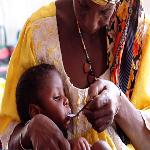A humanitarian agency warns that millions of people in West Africa are facing a food crisis. Oxfam is calling on donors to take immediate action. Oxfam's regional humanitarian coordinator, Nahuel Arenas, says there's no time to waste.
"We are talking about January/February. So this is why we need to respond now," he said.
People in Mauritania, Niger, Burkina Faso, Mali and Chad are said to be particularly at risk. Arenas said the Sahel region often experiences cycles of drought and floods, causing food insecurity. And while that didn't happen this year, the region did face a combination of problems.
"We had a very bad rain season, on which most of the rural population depends in the Sahel region. We had very few rains very badly spread over the territory. And at the same time we had an increase in prices in the markets. So what happens is that the local populations are facing the double challenge of low production and increasing prices. So less access to the markets," he said.
Cash and food
Oxfam reported cereal production fell this year and describes national food reserves as dangerously low. That's caused the jump in prices. Food is available at some markets, but people simply can't afford to buy it. Arenas said when that happens giving money is better than food aid.
"So in these cases we promote the use of cash transfers. So on one side we help households to access their food requirements and at the same time we support markets and the local economy," he said.
Oxfam said regional governments have already recognized the problem. It's calling on them to provide cash transfers and feed for livestock, while preparing to distribute emergency food aid. But the agency's regional humanitarian coordinator said international donors need to act now, as well.
"Our message would be that the international community can still avoid the worst if we act together now. We know from past crises that acting too late costs far more in lost lives and livelihoods and it's more expensive," said Arenas.
Oxfam is concentrating on food security, water and sanitation and advocacy to help deal with the situation.
